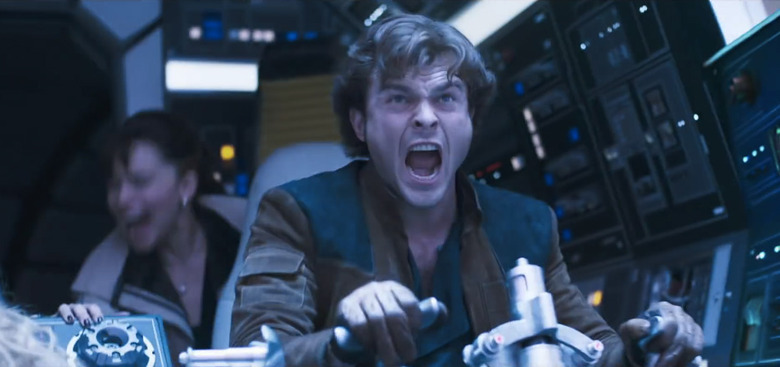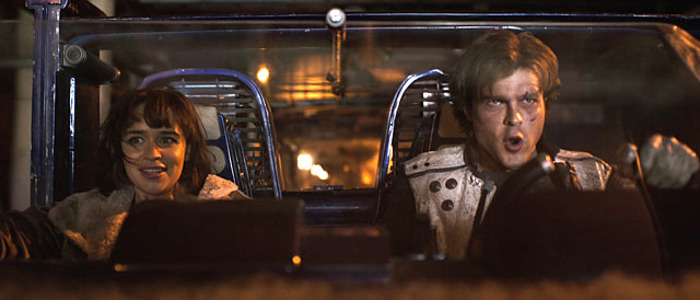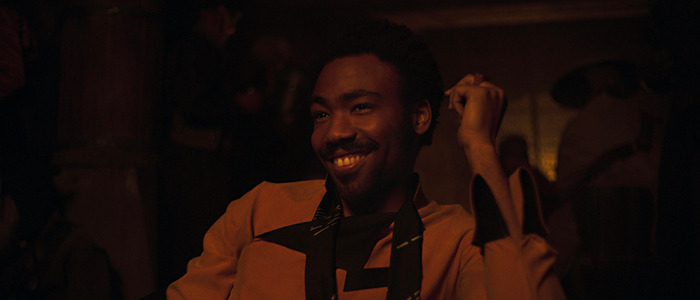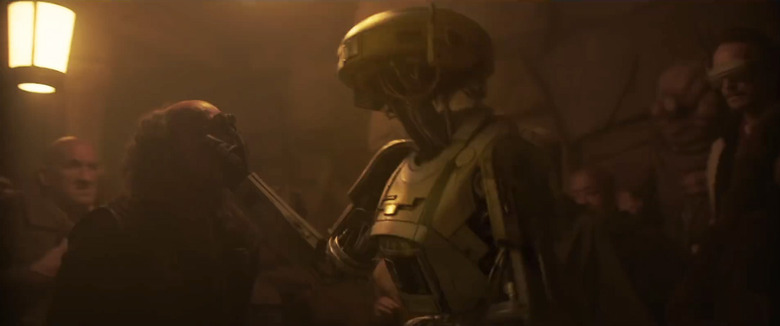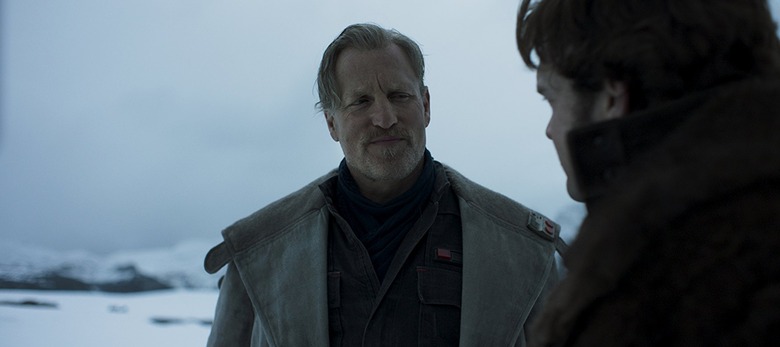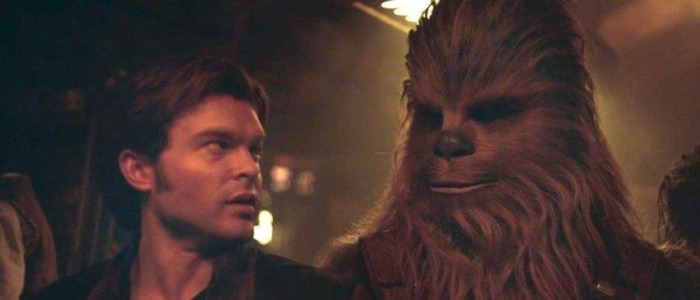The Echoes Of 'Solo': How The New 'Star Wars' Story Reflects Other Films In The Saga
One of the things Star Wars does better than almost every franchise is using new installments to add meaning to the previous entries in the saga. When Darth Vader uttered those infamous words, "No. I am your father," Star Wars fans were sent reeling, going back to watch A New Hope to add that new revelation to their understanding of every scene. Was Obi-Wan lying in his hovel about Anakin? Was Vader lying in Empire? Had Uncle Owen told the truth and Vader had really been a navigator on a spice freighter? The revelation tears through expectations and forces you to rethink everything you thought you knew.
With Solo: A Star Wars Story, we get moments that will shade meaning across the saga. They might not have the same weight as Vader's revelation, but what does?
We'll go through them film-by-film and give you a deeper appreciation for what Solo: A Star Wars Story really does for the core Skywalker saga.
A New Hope
There's a sizable gap of years between Solo: A Star Wars Story and A New Hope, about 10 years in fact. A lot has happened in that time, but Solo offers us clues about why Han Solo is the way he is.
"You mean you've never heard of the Millennium Falcon? It's the ship that made the Kessel Run in less than 12 parsecs. She's fast enough for you, old man," Han tells Obi-Wan Kenobi in Chalmun's Cantina in A New Hope. It's a boast so impressive that it makes you wonder why Obi-Wan hasn't heard. But this film gives you the idea that Han tells a lot of people and no one really cares. Maybe they don't even believe him, either. No one runs the Kessel Run in less than 20 parsecs not because their ships aren't fast, it's because the pilots aren't suicidal.
That particular run is also why Luke Skywalker remarks "What a piece of junk!" the first time he lays eyes on the ship. By then it was already a couple of decades out of date and Han really let the ship go.
One thing he did maintain was the Dejarik board. Chewie seems fond of playing holochess, so why not keep it? But it's interesting to note that when Chewie and Artoo play in A New Hope, Chewie gets upset by losing the same piece the same way as he did when he played against Beckett in Solo. Maybe Chewie just isn't a very good player and just never learns.
This film also establishes Han as the sort of character who will shoot first without asking questions, an echo of his encounter with Greedo. What's fascinating to me here is how the dynamic of the scenes echo each other in opposite directions. In A New Hope, Han murders Greedo, then tosses the bartender some credits and cooly says, "Sorry about the mess." It's cold blooded and doesn't bother him at all.
In Solo: A Star Wars Story, Han does the same thing to his mentor, Beckett, but it hurts him. He races to cradle his fallen father figure and comfort him in his dying moments. From this point, Han still has a lot of changing to do. We'll talk more about this moment later, though.
The Empire Strikes Back
The Empire Strikes Back has three of the most intriguing echoes that radiate from Solo: A Star Wars Story. The first comes in the form of Han's would-be tryst with Qi'ra in Lando's cape closet. It bears a striking resemblance to the scene in Empire where Han and Leia have their first kiss while trapped in the belly of the space slug. Han tells Leia to admit that sometimes she thinks he's all right. "Occasionally," she tells him. "Maybe. When you aren't acting like a scoundrel."
"Scoundrel? I like the sound of that." He goes on to say, "You like me because I'm a scoundrel. There aren't enough scoundrel's in your life."
"I happen to like nice men," she fires back.
"I'm nice man," he says.
"No you're not, you're—" she says before getting interrupted by a kiss.
In Solo, the scene is reversed. He's in the cape closet trying to convince Qi'ra he's a scoundrel because deep down she knows he's a nice man. Later in the film, he even inverts his "I'm a nice man," line and tells her, "No. I'm a terrible person," and happily proclaims himself an outlaw.
The scene with Qi'ra and Han's kiss here is perfectly interrupted by Beckett the same way Threepio interrupts Han and Leia's kiss.
In these moments, we know that Han is, deep down, the character he will eventually become: a hero who helps people, but this is his journey to fight and suppress that in order to survive in the world he was born into. This creates a fascinating social commentary as well. How many people live lives of crime who would otherwise be heroes if the circumstances of their socio-economic status allowed them to be? It's a fascinating question that Solo brings into sharp focus.
Lando
The next major echo from Empire radiates from the relationship between Han and Lando. In Solo, they meet for the first time and it seems like their entire relationship is based on one-upping each other. They both think they're the smartest person in the room, and neither of them really are. Like everything else in Han's life, his friendship with Lando is moving in reverse. Han seems to be trying to run from his destiny and Solo highlights that.
Han and Lando hate each other, and Han embraces that, not realizing they could ever be real friends later, when they've both matured. Significantly.
Through the film, we see key events that get referenced in their relationship as well, showing their development.
"I hate you," Lando tells Han.
"I know," he says, a direct reference to his response to Leia's profession of love for him in the carbon freezing chamber on Cloud City.
At the end of the film, Han greets Lando with fury that turns into a hug, turning their meeting on Cloud City around.
The Millennium Falcon
To me, the most heartbreaking echo into the future is the union between the Millennium Falcon and Lando's droid L3-37. L3-37, played by Pheobe Waller-Bridge, is unlike any droid we've seen in Star Wars. Headstrong. Sexual. And she also has the most impressive navigational mind in a droid that anyone has ever seen.
Her body is shattered after leading a droid and slave rebellion on Kessel and Lando grieves for her as though she were flesh and blood. He loved her. Truly.
And it's difficult for him to let go, but when an Imperial blockade blocks the path through the Kessel Run, Han needs all the navigational help he can get. Qi'ra and Lando work to install L3-37's mind into the mainframe of the Falcon itself.
It works and she's able to map the maelstrom and help find Han a route away from the Maw and through the Maelstrom, directly to their destination. But it was at a terrible cost.
Now, every time you hear Threepio tell Han, "I don't know where your ship learned to communicate, but it has the most peculiar dialect," it will always gut you.
You'll also notice throughout the films, the screenplate of L3-37's they install in the cockpit of the Falcon can be seen, plain as day, adding a ghostly presence to the navigational systems of the Falcon and a reason Han might personify the ship in his language the way he does.
"Hear me, baby? Hold together."
It also makes you reevaluate his words about the Kessel Run. If you notice, he never takes direct credit. He always says that it was the ship that did it. Having known L3-37, it makes a lot more sense.
It's a fitting end to her character as well – she wanted to bring freedom to the galaxy and strike at injustice and she became the ship that fired the shot that destroyed the second Death Star.
The Force Awakens
As we fast forward through the saga to the end of Han's life in The Force Awakens, we come back to his final appearance in Star Wars and want for the beginning.
We have to look at Han's ending with Beckett in this context, tied with his ending with his son. Through Solo, we see Woody Harrelson's Beckett serve as the father figure that Han has attached himself to. He wants desperately to be in the crew and no one wants him there. This serves as a direct contrast to how Han treats Rey, giving her the treatment that he wishes he'd received when he was younger. "I been thinking of bringing on some more crew, Rey," he tells the mysterious young girl, trying to offer her the place that he fought so hard for with Beckett. He sees so much of himself in Rey, from the hardscrabble upbringing as an orphan to her aptitude as a pilot and mechanic.
This is Han's central character trait in The Force Awakens, to treat others the way he wished he'd been treated as a young man. This is no more apparent than during his ending showdowns in both Solo and The Force Awakens.
In both cases we have a father figure on one side of the equation that has forced a confrontation with their son. In both cases, the father has to die. But the emotion Han wanted from Beckett is the emotion he gives to his son. Han doesn't want to kill Beckett, but knows he has to and that it's the only way to survive. In The Force Awakens, Han has been in the other side of this equation and knows that he will do anything his son needs for him to survive.
He gives his son the choice he never had. But his son makes the wrong decision and Han pays for it. But, as in both scenes, Han offers a last comfort to the other party in his duel. He cradle's Beckett's body in his dying breaths and he puts his hand on his son's face one last time before his own death.
This is who Han really is. It's who he's always been. He just spent so many years fighting it that he didn't really begin to live true to his authentic self until A New Hope.
The Last Jedi
The final punctuation mark on Han Solo's life, however, comes not with his death in The Force Awakens, but in his memory in The Last Jedi. Solo offers us a look at the significance of his golden dice. They first appeared briefly in A New Hope, but we didn't see them get their due until The Last Jedi. Luke, being the empathic person he is, pulled them from the Falcon to mourn his friends death. Clearly, he knew what these dice meant to Han, one of the few relics of his childhood he was able to retain.
Seeing Han offer those dice to Qi'ra and then get them back on Kessel proved how much emotional significance they had, which is why their appearance in Solo will add so much more to their weight when Luke delivers them to Leia, or when they vanish in Ben's hands at the end of The Last Jedi.
A good Star Wars film will offer us new things to think about in new contexts from one end of the saga to the other. Even though it's been disguised as "a fun heist film," Solo: A Star Wars Story delivers on that promise in spades and we'll be picking out threads and themes from it for decades.

